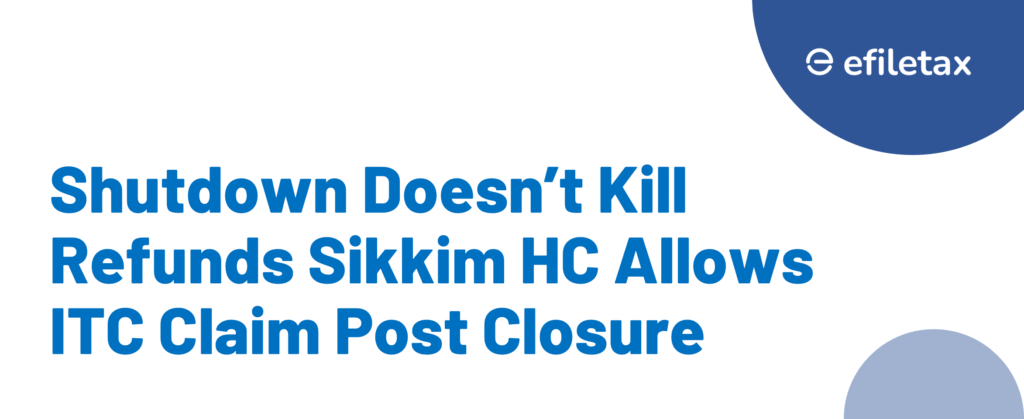
Can You Claim ITC Refund After Closing Your Business? Sikkim HC Says Yes
In a major relief to businesses, the Sikkim High Court has ruled that refund of unutilised Input Tax Credit (ITC) is permissible even after the closure of business. This landmark decision came in the case of SICPA India Pvt. Ltd., where the taxpayer was initially denied refund by GST authorities despite having reversed ITC on capital goods and other assets.
Let’s break down what this judgment means for taxpayers, how it aligns with the CGST Act, 2017, and what professionals should watch out for next.
Key Case Summary: SICPA India Pvt. Ltd. v. Union of India
| Particulars | Details |
|---|---|
| Court | Sikkim High Court |
| Petitioner | SICPA India Pvt. Ltd. |
| Issue | Refund of ITC after business closure |
| Ruling | Refund allowed despite closure |
| Key Legal Finding | No express bar in CGST Act to deny refund post-closure |
Why Was ITC Refund Denied Initially?
- SICPA India shut down its operations and reversed its ITC in line with Rule 44 of the CGST Rules.
- They applied for a refund of the remaining unutilised ITC balance.
- The GST department rejected the refund, arguing that refund is not allowed once a business has ceased to exist.
What Did the High Court Say?
The Sikkim HC held:
- There is no provision in the CGST Act that bars refund of ITC after closure.
- Just because a business is shut does not mean the right to refund ceases.
- The court reaffirmed Article 265 of the Constitution: “No tax shall be levied or collected except by authority of law.”
🔍 Expert View:
“This decision aligns with the basic tenets of tax justice — a taxpayer cannot be forced to forfeit their legitimate credit just because the shutters are down,” says a senior GST advisor at Efiletax.
Relevant Legal References
- Section 54(1) of the CGST Act allows any person to claim refund of tax or any other amount paid.
- Rule 44 of CGST Rules covers ITC reversal on closure of business.
- Article 265, Constitution of India mandates legal authority for tax collection.
Implications for Businesses and Consultants
This ruling sets an important precedent:
✅ Taxpayers winding up operations can still apply for unutilised ITC refund.
✅ GST officers cannot deny refunds arbitrarily without express legal bar.
✅ Encourages proper ITC reconciliation and reversal while filing for closure.
Tip:
Always maintain accurate reversal documentation under Rule 44 before filing a refund application post-closure.
What Should You Do Now?
If you’re planning to shut down your business:
- File Form GST REG-16 to surrender registration.
- Reverse ITC on capital goods, stock-in-hand as per Rule 44.
- Claim refund of remaining ITC using Form GST RFD-01.
- Track legal updates from CBIC in response to this ruling.
FAQs
Q1: Can a business claim refund after surrendering GST registration?
Yes, if ITC is reversed properly under Rule 44, refund can be claimed via Form RFD-01.
Q2: What if the officer rejects the refund despite the HC ruling?
You can appeal based on the Sikkim HC ruling. It has persuasive value unless overruled by the Supreme Court or a contradictory High Court ruling.
Q3: Is this ruling applicable pan-India?
While binding in Sikkim, the principle may be followed by other states unless challenged.
Final Thoughts
The Sikkim HC’s verdict marks a taxpayer-friendly interpretation of the GST law, clarifying that refunds don’t die with businesses. With no express restriction in the CGST Act, such refunds must be processed lawfully.
➡️ Need help claiming ITC refund post-closure?
Efiletax’s expert team can guide you through ITC reversals, refund filing, and GST surrender compliances.
Summary
The Sikkim High Court ruled that ITC refunds are allowed even after business closure, rejecting the GST department’s denial in SICPA India’s case. The judgment confirms no bar exists under CGST law, reinforcing taxpayers’ rights under Article 265 of the Constitution.